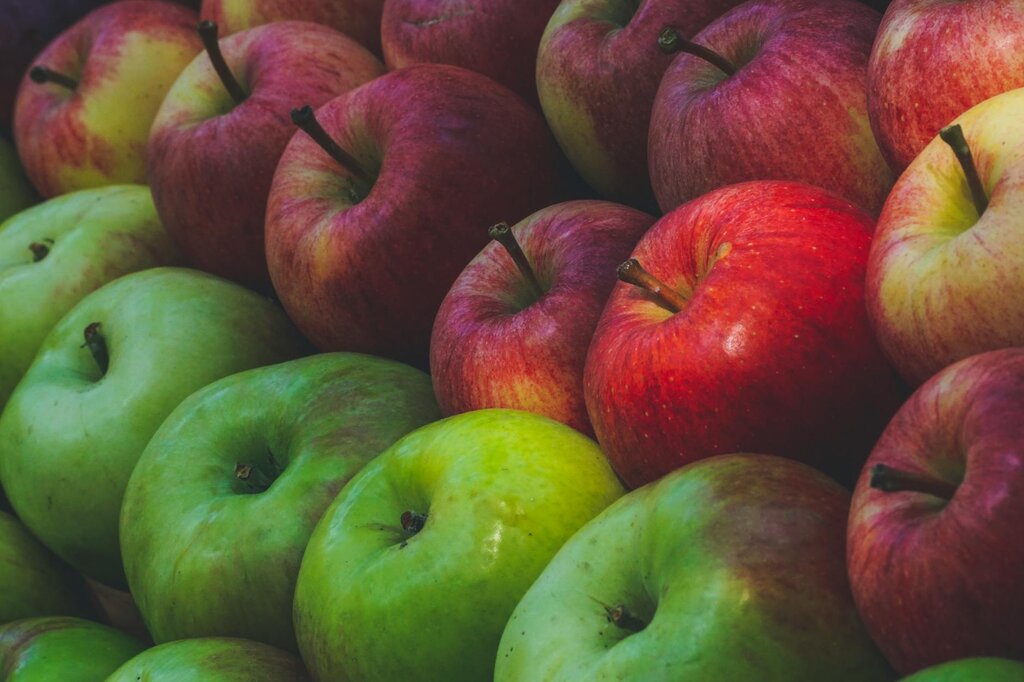Last Updated: 28/03/2025
Can Dogs Eat Apples?
Curious if apples are safe for your dog? Check our guide for all the answers
Author: Dr Nicole du Plessis BVSc (Hons)
Reading Time: 15 minutes - medium read
Apples are a staple in most households—who doesn't love the sweet crunch of a gala or the refreshing tang of a granny smith? But what about sharing this treat with your dog? Can dogs eat apples?
The answer is yes! Apples are a safe, nutritious, and tasty treat for dogs. As the saying goes, "an apple a day keeps the dog-tor away." A few slices make an excellent low-calorie alternative to traditional dog treats, especially for dogs on a diet.
However, not every part of the apple is safe. Apple cores and seeds should be avoided. The seeds contain amygdalin, which can release cyanide if chewed or broken down, posing a health risk. This compound is also found in the seeds of other fruits like cherries and pears. Additionally, apple cores are tougher than the flesh and can lead to choking or digestive issues.
When preparing apples for your dog, wash them thoroughly to remove pesticides or dirt, and cut them into small, bite-sized pieces for easy and safe snacking.
Health benefits of apples

Apples have numerous health benefits1. Apple is even included as a minor ingredient in some premium dog foods. Although apples are generally considered a healthy food, they still contain carbohydrates, which are sugars. Always remember to be treatwise and daily treats should only account for 10% of your dog's nutritionally balanced diet.
What are the specific benefits of feeding dogs apples?
Apples can be a beneficial addition to a dog's diet, providing several key nutrients:
- Vitamin C - important for fighting free radicals as well as supporting cognitive function
- Fibre - largely found in the apple skin and excellent for gut health
- Low in calories and cholesterol - great for obesity-prone dogs or dogs that need to lose some weight
- Low in protein - which makes apple a healthy treat for senior dogs
DID YOU KNOW? Apples contain approximately 52 calories per 100g2? Compare this to the supermarket dog treat Schmackos, which contains a whopping 260 calories per 100g. It's no wonder veterinarians recommend apples as a healthy treat.
Nutritional considerations of feeding apples
Can my puppy eat apple?
Yes! Your puppy can absolutely enjoy the taste of apple. Offering different varieties of food, like the juicy and crunchy texture of an apple, can be excellent enrichment for your puppy.
As with any introduction of treats, it should only be done under supervision. Always give apple in thin slices to reduce the risk of an excitable puppy choking. If any tummy upset should arise, it is best to avoid giving apple and consult your veterinarian.
Can dogs with certain health conditions still safely eat apples?
Apples can typically be safely included in the diet of a dog with health conditions like diabetes, but it's important to consult with your veterinarian first. Apples do contain sugar, albeit natural sugar. In dogs with diabetes, it's important to monitor their sugar intake to avoid spikes in blood glucose levels.
When it comes to apple-containing dog food, be sure to read the label carefully. Some commercial dog foods may contain added sugars or other ingredients that might not be ideal for a dog with a health condition.
Also, it's worth mentioning that while apples are generally safe for dogs, they should be served in moderation and always with the seeds and core removed. The seeds contain small amounts of cyanide which can be harmful in large quantities, and the core can pose a choking hazard or cause an intestinal blockage.
Remember, it's always best to consult with your vet before introducing a new food into your dog's diet, especially if they have a health condition.
How to feed your dog apples
To prepare apple for your dog or puppy, it is best to cut into thin slices that are easy to crunch on. During summer, you can give your dog chilled or frozen apple slices as a nice, cool treat. Chopped up apple can also be included in treat dispensers such as a KONG.
If you would like to let your dog experience a new food, always do so under supervision. This is particularly important with puppies, who can be overzealous and choke. Any new food introduction can potentially cause a gastrointestinal upset, so monitor your pet closely for any digestive issues.
Can I give my dog apple sauce or apple juice?
Fresh apple is ideal. Applesauce will often contain additional sugar and preservatives. Homemade apple sauce recipes still call for more sugar to be added for taste. Similarly, apple juice also contains very high amounts of sugar. Unfortunately, this can contribute to unwanted weight gain and, on occasion, gastrointestinal upsets.
History
Our experts continually monitor the health and wellness space and we update our articles when new information becomes available.
7th October 2022
Written by Dr Nicole du Plessis BVSc (Hons)Dr Nicole du Plessis BVSc (Hons)
Author, BVSc (Hons)
Dr. Nicole du Plessis is one of Pet Circle's qualified veterinarians and passionate pet care enthusiasts. Dr. Nicole graduated from the University of Queensland in 2016 with a Bachelor of Veterinary Science and worked for a number of years in small animal clinics across South East Queensland before joining the Pet Circle team. Over the years, Nicole has developed special interests in preventative medicine, infectious diseases, small animal medicine and ultrasound.

